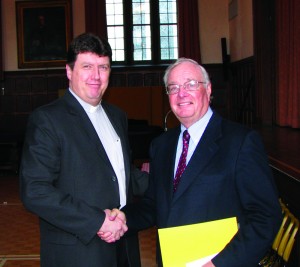
Former Prime Minister Speaks About Aboriginal Education
Paul Martin fascinated a large audience at Montreal’s Church of St. Andrew and St. Paul on March 18, with a description of his Aboriginal Education Initiative. One of the former prime minister’s many post-politics passions is a drive to improve primary and secondary education for native youth.
The church’s members, through a partnership with the Saskatoon Native Circle Ministry, continue to gain much understanding of First Nations history, culture and spirituality, and look forward to finding ways to apply Martin’s lessons.
Forty-three per cent of First Nations students off-reserve and 60 per cent on-reserve do not graduate from high school. Martin has called the underfunding of aboriginal education as “dumb as a bag of hammers.”
His three-pronged approach includes taking best teaching practices to remote schools via a dedicated website, model school projects, and mentoring to encourage aboriginal youth to complete high school and pursue careers. —Keith Randall
Campus Chaplain Wins Award
Rev. Marty Molengraaf, campus minister at the University of Guelph and pastor at Duff, Guelph, has won the 2012 R.P. Gilmor Student Life Award.
Molengraaf is the first Presbyterian chaplain to win the award, which is presented annually to two individuals—one student and one staff member—who contribute to “the betterment of student life.”
“The award signals the energy and contribution Marty’s leadership has brought to the student body,” said Clarence Swanton, chair of the Ecumenical Campus Ministry (ECM) board.
Molengraaf was excited about the award, but was quick to shift the focus away from himself.
“It’s great that the university recognizes the work the students have been doing with ECM,” he said.
According to both Molengraaf and Swanton, ECM’s work on campus is largely informed by ubuntu, an ancient African philosophy embraced today by many Christian thinkers including Archbishop Desmond Tutu. “It’s the idea that a person is a person through other people,” said Molengraaf. “To truly exist is to be truly alive in our relationships.”
This approach has opened doors to dialogue with multi-faith groups on campus. “When you respect what others believe there can be a true embrace of where people are,” said Molengraaf. “When otherness is broken down we have sense of connection with each other.”
When asked how a Christian chaplain can best partner with multi-faith groups, Molengraaf responded: “We are holding fast to who we are as Christians … [but] you have to let go of your ego; you have to let go of the idea that your way is the only way. … ‘I’ disappears in the light of ubuntu.” —Seth Veenstra
Preserving Memories
Memories of a 92-year-old Holocaust survivor have been recorded thanks to a Presbyterian minister.
Rev. Fairlie Ritchie was among 18 participants in a pilot program run by the Azrieli Foundation and Ryerson University, Toronto. It partnered Jewish Holocaust survivors who were unable to write their own memoirs with volunteers willing to transcribe their stories for them. Ritchie was one of only two non-Jewish volunteers to express interest in the project.
The retired minister was paired up with Leon Rotberg, a man originally from Lodz, Poland, who was sent to Auschwitz in 1943. Although they were only able to meet a few times, Ritchie says they “enjoyed each other’s company.”
“The second time we got together, he asked me, ‘Now, what’s your career? Where’s your work?’” she recalled. “And I said, ‘Well, I’m a Christian minister.’ He said, ‘That’s a fine vocation to have.’”
Ritchie’s transcription of Rotberg’s story was presented to both of them at a luncheon on April 17 at Kensington Place Retirement Residence, where Rotberg lives. His stories and those of his fellow survivors will be preserved by the Azrieli Foundation as part of its Holocaust Survivors Memoirs Program. —Connie Wardle
